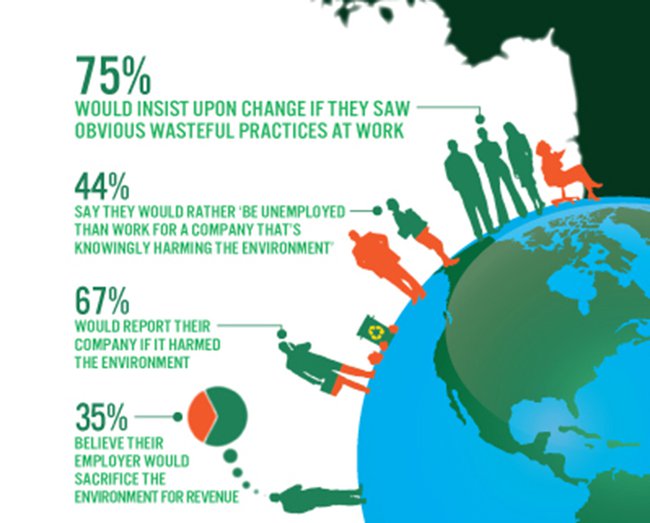By Margaret Badore
A survey released yesterday shows that many Americans want their workplaces to be more environmentally sustainable, and employers should take note.
The survey was commissioned by Ricoh Americas and conducted by Harris Polls. The survey of 948 employees, people defined as having part-time and full-time work, aimed to measure how much people care about their company’s sustainability practices.
The poll found that three out of four employees said they would insist on change if they saw an obviously wasteful practice at work. Sixty-seven percent said they would report if their company were harming the environment.
Perhaps most surprisingly, 44 percent of respondents said they’d rather be unemployed than work for a company that knowingly harms the environment. “People do not want to be associated with a company that is knowingly damaging the environment,” said Jason Dizzine, director or technology marketing at Ricoh. He also points out that the phrasing of the question regarding unemployment is very specific. “It’s not that they’d rather be unemployed than work for a company that doesn’t have the strongest environmental policy.”
It should be noted that the survey aimed to measure workers’ general attitudes towards sustainability, rather than look for their opinions on specific sustainability practices.
Many Americans feel that they are being more sustainable at home than at work, with 68 percent of respondents saying that they feel they do more for the earth at home than at work.
Although more than half (59 percent) of surveyed employees were optimistic about sustainability in the future, it’s clear that there’s still a lot of work to be done. Thirty five percent of employees think their companies would sacrifice the environment to increase profits and 18 percent said they’d seen an environmentally harmful activity at work.
“Employees are demanding these types of commitments to sustainability and environmental programs,” said Dizzine. He says that if companies want to attract top talent, adopting environmental practices is a good idea. It’s no longer just government regulations or even customers that should make companies care about sustainable practices. “I think it’s clear from this poll that employees are expecting us to take action as well.”
Read the original article here http://www.treehugger.com/corporate-responsibility/its-time-us-employers-go-green.html
My personal comments by Danny Clark
This past weekend I was in one of the largest retail chains in the world shopping for a few particular items. Being that it was Easter weekend, there was a very large display area filled with gifts and baskets. One thing that stood out in the center of this massive display, was an enormous mound of white plastic buckets. A pile so high of these plastic buckets; useable for making gift baskets and/or the obligatory Easter egg hunt. . There must have been hundreds of these white buckets at this particular store and I could only imagine that this same display was the same all over the country in each and every retail location. Thousands upon thousands of these plastic buckets that would ultimately be thrown in neighborhood trash cans in the next few days.
I happen to know this particular manufacturer and have worked with several people within their company. This particular manufacturer is one of the top five largest plastic manufacturers in the U.S. and produces millions of pounds of plastic items just like these one-time-use buckets. The majority of products produced by this manufacturer are one-time-use, non-recyclable, that will inevitably end up in landfills around the country.
What environmental mission would you expect from a company like this that produces millions of pounds of plastics and how should they take responsibility? This particular manufacturer suggests and supports the idea “that we all should recycle our plastics.” This is a great idea but does nothing to reduce the environmental impact this manufacturer places on the environment everyday by producing millions of pounds of plastic products that are destined for a landfill.
Somehow some companies have developed the notation that by simply stating “we support recycling” is somehow reducing their impact on the environment. I’m not sure that those who take this approach really truly understand what it means to take responsibility and take action to reduce their impact on the environment. One must actually do something; make a change in some way to start reducing their company’s environmental impact.
“Lobbing the turd,” by simply stating that your company supports recycling only makes the recycling issue someone else’s problem. In my opinion if these people within this manufacturer really supported recycling they would no longer produce a single product that didn’t have at least 30% recycled content. Imagine the change this would bring?
And what about using technologies such as ENSO RESTORE that bridge the gap between recycling and landfilling plastics? The technologies are out there that are better for the environment so it’s time to stop playing the “green” game by promoting an agenda that does nothing to reduce your company’s impact on the environment. Take responsibility by doing something to reduce the environmental impact your company places on the environment every day.
We all play an equally important part in solving the global plastic pollution problem, but it’s up to each of us to ask ourselves what we are doing to reduce our impact on the environment and then start doing something now to make a difference.



